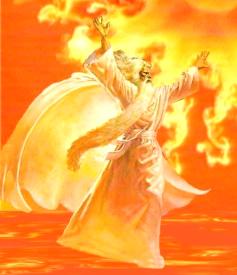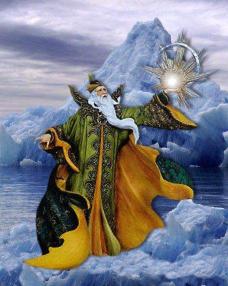The ancient wizard

This is the first in a possible series of articles describing possible paths of development for the basic archetypes. This time around we’re going to look at the “ancient wizard” and how one might reasonably be played as a character starting at first level.
In Men & Supermen, playing an ancient wizard is easy enough: choose the wizard package, and add in the power of immortality. Men & Supermen characters start the game at pretty much whatever power level you and your editor choose.
Gods & Monsters has a different path, however. Characters start at first level and don’t have a lot of power.
What is a first level character?
Normally, the way people play characters is to match their game statistics with their in-world abilities. This is not the only option, however. In novels, protagonists such as the ancient wizard will often use far lesser power towards the beginning of the story than they do towards the end of the story. They do this not because they are weak at the beginning of the story, but because the author feels it will be more exciting to display higher levels of power as the story progresses.
It is more precise to say that in Gods & Monsters, characters start at first level and do not display a lot of power. This difference can help you play the ancient wizard.
The low level “ancient wizard” is perhaps typified by Tolkien’s Gandalf, the several-thousand-year-old maiar who guided Tolkien’s heroes through their quests. Objectively, Gandalf was far from first level. The powers he displayed, however, especially towards the beginning of the Hobbit, are not that powerful. The power that Gandalf actually used rose as the story reached its climax.
In a very real, if arbitrary, sense, Gandalf grew in level as the Hobbit, and later the Lord of the Rings, progressed.
Abilities
The ancient wizard is usually, but not always, highly intelligent, with a powerful and perceptive personality. The ancient wizard commands attention. Take care to choose appropriate intelligence and charisma scores.
High intelligence will also increase the number of spells your character will be able to use at first level. Being able to cast more than one spell at a time is a must for the ancient wizard.
Skills
The ancient wizard is usually well-versed in the knowledge of cultures long-dead. The wizard will have ancient history as well as probably several ancient and modern languages. The ancient wizard will probably also know the lore of old magic and myths and will be well-versed in spellcraft. You might even add in some ancient, historical, spellcraft so as to understand spellcraft now long dead.
Such a character is not only well-traveled, but has well-placed contacts throughout the known world. The character will also understand the motivations of the major political leaders.
Merlin, in Boorman’s Excalibur, displayed very little magic. His power was mostly a matter of being in the right place at the right time. He knew where to be because of his knowledge of ancient lore and his understanding of the major personalities of the era. Merlin knew what they were willing to fight for, who would likely join and oppose whom, and why.
In the Hobbit, Gandalf’s powers seem to be mostly his contacts throughout middle-earth and his long-windedness.
Think about the kind of things your character needs to know, and don’t be afraid to work with your Guide to make up skills that cover precisely what your character needs. Don’t forget that your character’s age will give them several more skills. A two-hundred year old character will have six extra skills. Apply them wisely!
Specialties
The ancient wizard is, of course, ancient. The first specialty to take if you wish to play a human ancient wizard will be long life. The character can then easily be several hundred years old. An Elvish ancient wizard will have long life as an option without a separate specialty, as may some other species.

The ancient wizard often carries an ancient staff, or picks one up somewhere in the story. This is useful, because the staff of power specialty also grants a bonus of one to casting levels.
Other possibilities include the charismatic specialty, and don’t forget that contacts is also a specialty for truly useful contacts. For the singular of purpose and high moral code, the ancient wizard could also be an exemplar of some moral code.
Having a familiar can help your character scout out possible paths while the rest of your character’s companions are resting.
If you want your character to affect the world even after death, a good understanding of reliquary magic will allow your character to leave relics behind when they die.
If your Adventure Guide approves, you might also choose to play an aged wizard without first taking the long life specialty. Take staff of power first, and then take long life later. This will delay the long life benefits, including the extra skills for being old. But it will also, for a first-level sorceror, double your character’s casting level: at first level, that bonus of one level can make quite a difference.
Spells
The most useful spells will be those of subtle and varied effect. Something as simple as Farseeing will allow the ancient wizard to recognize deadly foes or ancient ruins long before anyone else does. Understand languages fills out those languages the character does not yet know, and also has the added benefit of being reversible. Similarly, Sense magical aura helps the ancient wizard separate trinkets from items of power.
The Suggestion spell, as Obi-Wan Kenobi found, is useful for getting around sticky situations instead of having to fight through them. And when all else fails, an Aura of confidence can help the ancient wizard bluff their way through many situations. At second level or higher, or with the assistance of a staff of power, the Charisma spell will help, especially for those wizards whose charisma is already high.
For physical spells, Sunlight is a simple but effective spell for delving into deep places. And it has the advantage of doubling as a Darkness spell for those times your character and companions need to escape quickly. For those ancient wizards who keep falling off of tall heights or into deep holes, Slow fall is invaluable.
At second level, there is little more mysterious and practical than Smoky stairs. For the wizard who prefers not to leave omens to chance, the Dreams spell will help give the appropriate people the appropriate ideas.
Dream spells in general are a good choice for this sort of wizard. Subtle and mysterious, and when used intelligently, very powerful. At third level, the Dream omen spell helps keep the wizard from being too surprised about the future.
The ancient wizard should also consider making up their own spells. When it comes to projecting mystery and power, nothing beats using a spell that nobody has ever heard of. Name it after some thing, place, or person long dead. If your character is the kind of ancient wizard who has plans for the future, think about what spells will help shape the future that you want.
Play the part
Finally, play the part: if your character is two hundred and fifty years old, work with the Guide to make up names your character can drop: political leaders long dead, the grandparents or grand-uncles and aunts of the other characters. Places that are now fallen to ruin. You don’t have to do it all at once. Work out a little bit more before each game.
Age, skills, spells, and specialties. They are all tools that will help you play an ancient, first-level character whose display of power matches the progression of fictional wizards.
- The Hobbit and The Lord of the Rings
- The best fantasy books I have ever read. “In a hole in the ground there lived a hobbit...” I found the animated movie to be marvelous as well. And the new movies by Peter Jackson are awesome! Great, great stuff.
- Excalibur
- Hard to go wrong for the price, and this is the best retelling of the Arthurian saga that I’ve seen on screen. It also includes some early parts by Patrick Stewart, Liam Neeson, and Gabriel Byrne.
- Excalibur•
- Hard to go wrong for the price, and this is the best retelling of the Arthurian saga that I’ve seen on screen. It also includes some early parts by Patrick Stewart, Liam Neeson, and Gabriel Byrne.
More spotlight
- Spotlight on: The Saurian
- Who are these enigmatic lizards of ancient jungles? The saurian is the most unique of all the player character species.
- Mental mismatch
- High wisdom, low intelligence. D’uh, which way did he go, George? Which way did he go?
- Spotlight on: Unaligned
- What does it mean to not have a moral code in Gods & Monsters?
- Spotlight on: The Prophet
- Why would Mohammed, Jesus, or Moses head into a dungeon? A game with a prophet in a player-character role will be very different from a game without prophets. Something will need to drive Jonah into the whale.
- Spotlight on: Evil
- No one considers themselves Evil. So how does the Evil moral code relate to the game of Gods & Monsters? How and why do Evil non-player characters act?
- One more page with the topic spotlight, and other related pages
